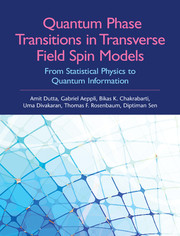 Quantum Phase Transitions in Transverse Field Spin Models
Quantum Phase Transitions in Transverse Field Spin Models Book contents
- Frontmatter
- Dedication
- Contents
- List of Figures and Tables
- Preface
- Acknowledgements
- I An Introduction to Quantum Phase Transitions, Information and Dynamics
- 1 Quantum Phase Transitions
- 2 Information Theoretic Measures Close to a Quantum Critical Point
- 3 Non-Equilibrium Dynamics across Quantum Critical Points
- II Transverse Field Models: Statics
- III Transverse Field and Related Models: Non-Equilibrium Dynamics
- IV Experimental Realizations of Transverse Field Models
- V Quantum Annealing and Adiabatic Quantum Computations Using Transverse Field Models
- Appendix A Derivation of a Matrix Product Hamiltonian
- Appendix B From Jordan–Wigner to Bosonization: Tomonaga–Luttinger Liquids
- Appendix C Calculation of the Entanglement Entropy for a Transverse Ising Chain
- Appendix D The Loschmidt Echo for the One-Dimensional XY Model
- Appendix E Landau–Zener Tunneling: Calculation of Non-Adiabatic Transition Probability
- Appendix F A Note on the Theoretical Studies of Hysteresis
- References
- Index
- Plate Section
1 - Quantum Phase Transitions
from I - An Introduction to Quantum Phase Transitions, Information and Dynamics
Published online by Cambridge University Press: 05 May 2015
- Frontmatter
- Dedication
- Contents
- List of Figures and Tables
- Preface
- Acknowledgements
- I An Introduction to Quantum Phase Transitions, Information and Dynamics
- 1 Quantum Phase Transitions
- 2 Information Theoretic Measures Close to a Quantum Critical Point
- 3 Non-Equilibrium Dynamics across Quantum Critical Points
- II Transverse Field Models: Statics
- III Transverse Field and Related Models: Non-Equilibrium Dynamics
- IV Experimental Realizations of Transverse Field Models
- V Quantum Annealing and Adiabatic Quantum Computations Using Transverse Field Models
- Appendix A Derivation of a Matrix Product Hamiltonian
- Appendix B From Jordan–Wigner to Bosonization: Tomonaga–Luttinger Liquids
- Appendix C Calculation of the Entanglement Entropy for a Transverse Ising Chain
- Appendix D The Loschmidt Echo for the One-Dimensional XY Model
- Appendix E Landau–Zener Tunneling: Calculation of Non-Adiabatic Transition Probability
- Appendix F A Note on the Theoretical Studies of Hysteresis
- References
- Index
- Plate Section
Summary
Aim and Scope of this Book
A plethora of systems exhibit phase transitions as the temperature or some other parameter is changed. Examples range from the ice-water phase transition observed in our daily life to the loss of ferromagnetism in iron or to the more sophisticated Mott insulator-superfluid phase transition observed in optical lattices [343]. The last five decades have witnessed a tremendous upsurge in the studies of phase transitions at finite temperature [727, 149, 333, 136, 494, 541, 556]. The success of Landau-Ginzburg theories and the concepts of spontaneous symmetry breaking and the renormalization group [27, 410, 821, 578] in explaining many of the finite temperature phase transitions occurring in nature has been spectacular.
In this book, we will consider only a subclass of phase transitions called quantum phase transitions (QPTs) [154, 658, 725, 799, 185, 63, 62, 66, 141, 744] and we will discuss these mainly from the view point of recent studies of information and dynamics. QPTs are zero temperature phase transitions which are driven by quantum fluctuations and are usually associated with a non-analyticity in the ground state energy density of a quantum many-body Hamiltonian. We will focus on continuous QPTs where the order parameter vanishes continuously at the quantum critical point (QCP) at some value of the parameters which characterize the Hamiltonian. We will not discuss first order quantum phase transitions associated with an abrupt change in the order parameter. Usually, a first order phase transition is characterized by a finite discontinuity in the first derivative of the ground state energy density. A continuous QPT is similarly characterized by a finite discontinuity, or divergence, in the second derivative of the ground state energy density, assuming that the first derivative is continuous. This is of course the classical definition; we will later mention some QPTs where the ground state energy density is not necessarily singular.
Information
- Type
- Chapter
- Information
- Quantum Phase Transitions in Transverse Field Spin ModelsFrom Statistical Physics to Quantum Information, pp. 3 - 31Publisher: Cambridge University PressPrint publication year: 2015